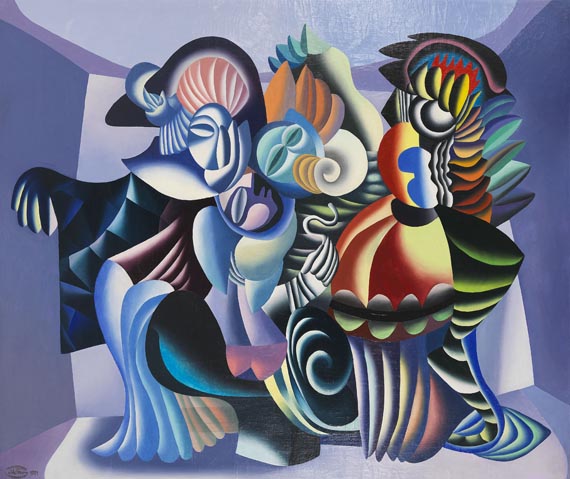
176
Johann Georg Müller
Maskerade, 1971.
Oil on canvas
Estimation:
€ 90,000 / $ 106,200 Résultat:
€ 140,300 / $ 165,554 ( frais d'adjudication compris)
176
Johann Georg Müller
Maskerade, 1971.
Oil on canvas
Estimation:
€ 90,000 / $ 106,200 Résultat:
€ 140,300 / $ 165,554 ( frais d'adjudication compris)
Oil on canvas
Scholzen/Roeber M 71/1. Signed and dated lower left. With inscription "2C+10 Joh. Georg Müller 'Maskerade' Koblenz 1971" on verso. 200 x 237,5 cm (78,7 x 93,5 in)
EXHIBITION: Landeskunstausstellung Rheinland-Pfalz, Kurfürstliches Schloss Koblenz 1973 (with label on stretcher).
Johann Georg Müller. Gemälde, Mittelrheinisches Landesmuseum Mainz, 15 December 1981 - 13 January 1982.
Johann Georg Müller. Gemälde, Künstlerhaus Metternich, 31 January - 7 March 1982.
Johann Georg Müller was born the son of an industrial architect in Ludwigshafen in 1913. He began to train in drawing while he was still in school; at first at his fathers desk, where he learned technical drawing and later in evening courses at the Mannheim free academy. After having finished school Johann Georg Müller did an apprenticeship to be a carpenter, later he began to study civil engineering. He discontinued his studies after a short while and continues to take courses with Albert Henselmann at he free academy. Out of interest he examines the works of Wilhelm Leibl and Hans Holbein in the Munich Pinakothek, later he said that these were decisive influences for his artistic development. As of 1937 he worked in Munich as a freelance artist, however, an exhibition ban was imposed on him in 1938. In 1950 he went to Koblenz for a year on a scholarship. A short time after the war Müller focused on graphic art, but began to make more paintings after he had moved into a new studio. In 1955 the artist’s first single exhibition took place in the gallery Spielhagen in Koblenz, in 1957 the city of Koblenz acquired the first painting by Müller for the municipal collection. Johann Georg Müller went onto a journey to Crete for several months in 1960, a trip that gave new impulses to his artistic creation. The Mediterranean colors and lights inspired him to make his plant paintings, which, next to the machine paintings, would become so characteristic of Johann Georg Müller's work. He conveys the biomorphic forms of the plant pictures to all other subjects.
Müller developed his style based on the based, its depiction is affected by the decomposition by a design draftsman and a woodcutter. However, a certain expressiveness flows into the clear stylistic features and the partly architectural composition is emphasized by the contrasting and strongly shaded colors. Numerous works of this type were made in the 1970s, which count among the strongest and most powerful compositions of the artist. Accordingly, in our composition Müller also renders old motifs such as the masks in his new biomorph style.
In the 1970s Müller began to explore new artistic means, he made black and white photographs and narrow-gauge films. Up until the end, Johann Georg Müller worked eight hours a day in his studio. The artist died on 20 June 1986 in Koblenz. [SM].
Scholzen/Roeber M 71/1. Signed and dated lower left. With inscription "2C+10 Joh. Georg Müller 'Maskerade' Koblenz 1971" on verso. 200 x 237,5 cm (78,7 x 93,5 in)
EXHIBITION: Landeskunstausstellung Rheinland-Pfalz, Kurfürstliches Schloss Koblenz 1973 (with label on stretcher).
Johann Georg Müller. Gemälde, Mittelrheinisches Landesmuseum Mainz, 15 December 1981 - 13 January 1982.
Johann Georg Müller. Gemälde, Künstlerhaus Metternich, 31 January - 7 March 1982.
Johann Georg Müller was born the son of an industrial architect in Ludwigshafen in 1913. He began to train in drawing while he was still in school; at first at his fathers desk, where he learned technical drawing and later in evening courses at the Mannheim free academy. After having finished school Johann Georg Müller did an apprenticeship to be a carpenter, later he began to study civil engineering. He discontinued his studies after a short while and continues to take courses with Albert Henselmann at he free academy. Out of interest he examines the works of Wilhelm Leibl and Hans Holbein in the Munich Pinakothek, later he said that these were decisive influences for his artistic development. As of 1937 he worked in Munich as a freelance artist, however, an exhibition ban was imposed on him in 1938. In 1950 he went to Koblenz for a year on a scholarship. A short time after the war Müller focused on graphic art, but began to make more paintings after he had moved into a new studio. In 1955 the artist’s first single exhibition took place in the gallery Spielhagen in Koblenz, in 1957 the city of Koblenz acquired the first painting by Müller for the municipal collection. Johann Georg Müller went onto a journey to Crete for several months in 1960, a trip that gave new impulses to his artistic creation. The Mediterranean colors and lights inspired him to make his plant paintings, which, next to the machine paintings, would become so characteristic of Johann Georg Müller's work. He conveys the biomorphic forms of the plant pictures to all other subjects.
Müller developed his style based on the based, its depiction is affected by the decomposition by a design draftsman and a woodcutter. However, a certain expressiveness flows into the clear stylistic features and the partly architectural composition is emphasized by the contrasting and strongly shaded colors. Numerous works of this type were made in the 1970s, which count among the strongest and most powerful compositions of the artist. Accordingly, in our composition Müller also renders old motifs such as the masks in his new biomorph style.
In the 1970s Müller began to explore new artistic means, he made black and white photographs and narrow-gauge films. Up until the end, Johann Georg Müller worked eight hours a day in his studio. The artist died on 20 June 1986 in Koblenz. [SM].



